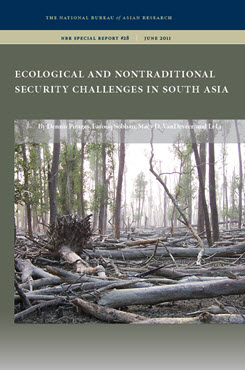Ecological Security
A Framework for Analyzing Nontraditional Security Issues
This essay lays out a new nontraditional security paradigm, specifically with respect to security challenges that South Asia faces due to ecological disruptions.
EXECUTIVE SUMMARY
This essay lays out a new nontraditional security paradigm, specifically with respect to security challenges that South Asia faces due to ecological disruptions.
MAIN FINDINGS
- Nontraditional security or ecological crises have been responsible for killing and injuring substantially larger numbers of people over time than conventional military threats, and therefore represent a parallel and arguably more important source of insecurity.
- Ecological or nontraditional security depends on maintaining a dynamic equilibrium between humans and nature, humans and other species, and humans and pathogens, as well as among human societies.
- Demographic changes, specifically population growth, are the most destabilizing factors in developing countries. Ecological security problems are created as the capabilities of nature are unable to meet the demands of rapidly growing societies.
- Deepening globalization and increasing urbanization have the potential to severely destabilize the equilibrium between human populations and pathogens. Recent outbreaks of new infectious diseases may foreshadow serious pandemics in the near future.
- Global warming will have a major impact on all four relationships defining ecological security: coastal areas will be at greatest risk due to flooding; warming will permit pests and pathogens, particularly tropical diseases, to move beyond their traditional regions; and the disruption of ecological equilibrium could increase conflict between societies.
POLICY IMPLICATIONS
- The likely exponential increase in ecological security challenges over the next three decades, both globally and in South Asia, must be met by a heightened ecological security perspective capable of identifying and addressing this broad array of challenges.
- Creating a more ecologically secure world will require adjusting defense expenditures to better reflect the actual security threats of the 21st century, which are increasingly nontraditional rather than conventional military threats.
- The adoption of an ecological security perspective will also involve recognizing that we live in a global system in which increasingly porous borders make cooperation among neighboring countries essential for future well-being.


